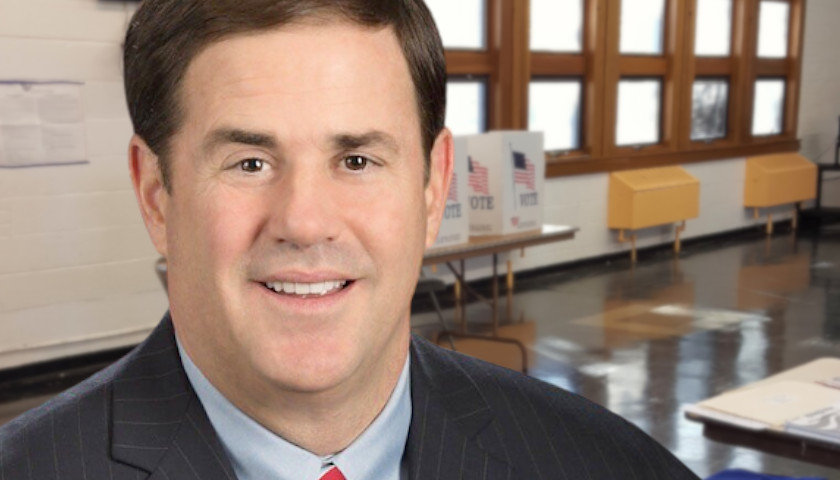The whole country is watching Arizona to see if it will strengthen election integrity laws after fraud was strongly suspected there in the 2020 presidential election. So far during the 2022 legislative session, the Arizona Legislature has referred one comprehensive measure to the ballot, the Arizonans for Voter ID Act, and Gov. Doug Ducey has just signed the first election integrity bill to hit his desk. HB 2492, sponsored by State Representative Jake Hoffman (R-Queen Creek), requires proof of citizenship in order to register to vote, with the exception of voting in congressional elections, which is pre-empted by federal law.
Hoffman told the Arizona Sun Times, “Today is a historic day for Arizona and a great victory for Arizonans and all Americans alike. The signing into law of Arizona House Bill 2492, which requires verification of U.S. citizenship to be eligible to vote in Arizona elections, is a giant step toward ensuring elections are easy, convenient, and secure in our state. HB 2492 is an incredibly well-crafted piece of legislation that is on sound legal footing and broadly supported by voters of all political parties. I am confident that should Democrats challenge HB 2492 in court it will only serve to further reinforce its clear constitutionality.”
The law, which passed both chambers along party lines, establishes tough penalties for those who violate it; it is a felony for election officials to register voters without proof of citizenship. County recorders are required to regularly cross-reference registered voters with citizenship databases. It gives the Arizona attorney general authority to investigate.
The history leading up to HB 2492 is convoluted. In 2004, Arizonans passed Prop. 200, which required proof of citizenship in order to register to vote. But a Supreme Court decision in 2013 carved out a loophole. The 7-2 majority ruled that Arizona could not enforce the citizenship rule for federal-only voters, since federal law, the National Voter Registration Act of 1993, pre-empts the state in this area. Instead, per that act, those voters could use a federal form that merely asked them to affirm, under penalty of perjury, that they are citizens.
There are currently about 31,000 federal-only voters who would be affected by the legislation. Roughly 7,000 federal-only voters cast ballots for president in Arizona in 2020. They would merely need to show proof of citizenship; such as their driver’s license, state ID, or passport in order to also vote in state and local elections, as well as for president, since the U.S. Constitution gives states the authority to decide how presidential electors are chosen.
Opponents say voters who registered to vote before 1996 will also need to show ID again since Arizona did not require proof of citizenship to obtain driver’s licenses prior to that. There are 192,000 people who have those older driver’s licenses. However, proponents of the bill say this isn’t true.
Hoffman told the Sun Times, “The language of the bill, specifically the new language in A.R.S. 16-101 and 16-121 that the opponents claim will cause everyone to re-register, clearly states, “has provided satisfactory evidence of citizenship as prescribed in section 16-166. That statutory reference encompasses all of 16-166, including Subsection G, which ‘grandfathered’ in those who were already registered at the time of Prop 200’s effective date in 2005. Under this language they are ‘deemed to have provided satisfactory evidence of citizenship.’ HB2492 directly refers to that provision, as well as others in 16-166, resulting in those voters still being ‘deemed to have provided satisfactory evidence of citizenship.'”
Democratic Secretary of State Katie Hobbs, who has fought election integrity efforts, sent a letter to Ducey demanding that he veto the bill. She complained about the bill making it a felony to register a non-citizen to vote. However, it is a felony for a non-citizen to vote.
Yesterday, I asked @dougducey to veto HB2492. The bill clearly violates federal law & creates new barriers for voters that are unrelated to any legitimate election integrity purpose.
For the good of AZ’s voters, election officials, & taxpayers, @dougducey should veto HB2492. pic.twitter.com/bEiUDUDveW
— Secretary Katie Hobbs (@SecretaryHobbs) March 25, 2022
Opponents are issuing unverified warnings like “This Arizona bill could keep you from voting early, by mail or for president.” The progressive organization Stand Up America declared, “The bill could remove millions of eligible Arizonans from the voter rolls.” Leaders from Stand Up America, Living United for Change in Arizona (LUCHA), and Arizonans for Fair Elections held a press conference call to try and stop the bill.
Proponents of the bill point to evidence that numerous non-citizens are voting illegally in Arizona. In 2018, then-Arizona Secretary of State Michele Reagan entered into a settlement in response to a lawsuit from LUCHA, agreeing to no longer require non-citizens to show proof of citizenship to vote in state and local elections. LUCHA argued that it was too cumbersome to require proof of citizenship for state and local elections but not for federal elections. Gina Swoboda, executive director of the Voter Reference Foundation, said Reagan should not have caved, and Arizona probably would have prevailed.
Because of that agreement, Greg Blackie, deputy director of policy for the Arizona Free Enterprise Club, said the number of non-citizens illegally voting in Arizona went from 1,600 in 2018 to 11,600 in 2020 — more than Trump lost to Joe Biden by in the state.
Just Facts conducted an investigation of the 2020 presidential election and found an even higher number; 51,081 non-citizen votes were cast for Biden in Arizona, with a margin of error of 17,689. USA Today attempted to fact-check the research, and concluded that it was “plausible but unproven.”
The bill will take effect after the 2022 primary election but before the general election.
– – –
Rachel Alexander is a reporter at the Arizona Sun Times and The Star News Network. Follow Rachel on Twitter. Email tips to [email protected].
Background Photo “Voting Booths” by Tim Evanson. CC BY-SA 2.0.








